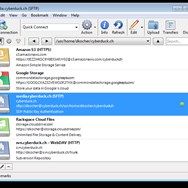FileZilla vs Cyberduck
Compare features, pricing, and capabilities to find which solution is best for your needs.

FileZilla
FileZilla is a popular open-source FTP, FTPS, and SFTP client, known for its ease of use and robust feature set. It provides a reliable way to transfer files to and from remote servers, supporting a wide range of protocols for secure and efficient data handling. by FileZilla Project

Cyberduck
Cyberduck is a free, open-source client for file transfer, supporting FTP, SFTP, WebDAV, and major cloud storage services. It provides a user-friendly interface for managing files on servers and in the cloud. by iterate GmbH
Comparison Summary
FileZilla and Cyberduck are both powerful solutions in their space. FileZilla offers filezilla is a popular open-source ftp, ftps, and sftp client, known for its ease of use and robust feature set. it provides a reliable way to transfer files to and from remote servers, supporting a wide range of protocols for secure and efficient data handling., while Cyberduck provides cyberduck is a free, open-source client for file transfer, supporting ftp, sftp, webdav, and major cloud storage services. it provides a user-friendly interface for managing files on servers and in the cloud.. Compare their features and pricing to find the best match for your needs.
Pros & Cons Comparison

FileZilla
Analysis & Comparison
Advantages
Limitations

Cyberduck
Analysis & Comparison
Advantages
Limitations
Compare with Others
Explore more comparisons and alternatives
















